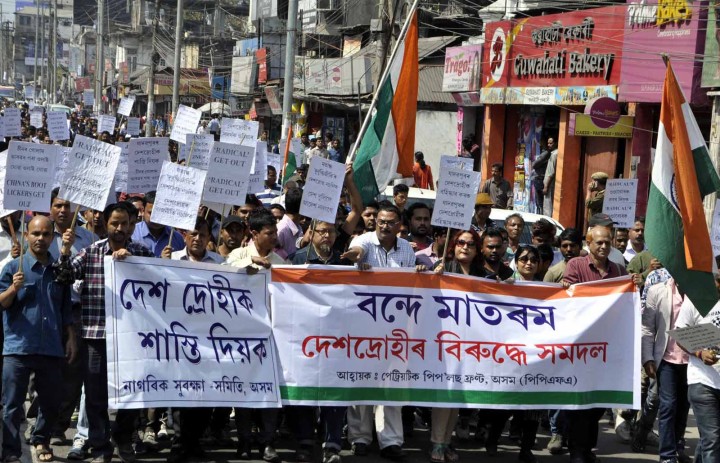Guwahati, northeast India: A common protest demonstration, where thousands took part chanting slogans against anti-national elements marched on the busy streets of the city of Guwahati recently. The aftershocks of that massive protest march however went on for weeks in Assam, where a number of media outlets did not hesitate to play their usual tricks. In fact, thousand of citizens joined in the protest rally putting up with the hot morning sunshine on 27 February 2016 with the national flag in their hands, which march started from Dighalipukhuri point and culminated at the same place after marching up to Chandmari locality of this ancient city of northeast India.
The Guwahatians devotedly responded to the call of Patriotic People’s Front Assam (PPFA) for the protest march condemning the anti-national advocates that emerged from different higher educational institutions like Jawaharlal Nehru University (JNU), Jadavpur University etc in the recent past.
The protesters rubbished the section of JNU students for terming Afzal Guru, who was executed for his involvement in 2001 Indian Parliament attack, a martyr. The JNU students also showed further audacity to point out the execution of Guru on 9 February 2013 as an extra-judicial killing and they even resolved to fight to break India into a thousand parts until it’s destruction is complete.
Those anti-India JNU students organized a meeting on 9 February evening inside the JNU campus to commemorate the execution of Guru even though he was executed after an exhausting judicial process. Later they organized another commemorative meeting at Press Club of India, the very next day, where too anti-India slogans were raised. Similar acts broke from Jadavpur University in West Bengal, where a few students indulged in anti-national sloganeering and poster-planting.
The JNU controversy has already gripped huge public space in India with international media attention as the authority had arrested many student leaders under sedition charges. Numerous public rallies were organized in different parts of the country criticizing the Bharatiya Janata Party (BJP) led government’s immature handling of JNU issues. Both houses of Indian Parliament debated the matter, where the opposition law-makers criticized the Centre for its aggressive actions against democratic exercises.
Earlier, in another development the Union HRD minister Smriti Irani initiated raising the national flag in India’s 46 Central Universities regularly. The vice-chancellors of these universities had a meeting with the minister on 18 February and resolved unanimously that the national tri-colour would be flown prominently and proudly on their campuses to signify a united India.
The PPFA, which is a forum of conscious individuals without any political party alliance, hailed the initiative arguing that it would help in erasing the unwanted impression about the New Delhi based prestigious institute that the JNU had virtually turned into a hotbed for anti-India elements. Underlining the importance of elevating the tri-colour, the forum pointed out that it symbolizes the immense sacrifice made by millions of known and unknown freedom fighters to make India an independent nation and every responsible citizen should salute the national flag.
“It has been observed that separatist elements and a bunch of so-called intellectuals of the country have long been opposing the hoisting of the tri-colour citing their grievances against the Union government. They must understand that the national flag does not belong to the government, rather it is owned by every Indian citizen,” said Rupam Barua of PPFA.
The participants of Guwahati march chanted slogans like ‘Vande Mataram, Joi Asom, Anti-Nationals Go Back, Down Down Anti-Nationals, Punish JNU Anti-Nationals, Condemn Jadavpur Anti-Nationals, ‘RADICAL’ Get Out, China’s Bootlickers Get Out etc’.
The long march was led by a number of noted citizens, including eminent journalist Dhirendra Nath Chakrabarty, noted publisher Giripad Devchoudhury, retired bureaucrat Rohini Barua, award-winning film-maker Manju Bora, ex-army officer Ranjan Dutta, film-critic Utpal Datta, popular singer Babita Sarma, academician Jagadindra Raychoudhury, publisher Dhiraj Goswami, physician Alekhya Barua, environmentalist Soumyadeep Dutta, entrepreneur Ujjal Saikia etc. It was also joined by popular writer Namrata Dutta, photography director Jiban Dowka, councilor Sunita Bhiluwaria, social activists Kailash Sarma, Pankaj Jalan, Kishor Saini, lawyers Chinmoy Choudhury, Chinmoy Sarma Barua,Tapas Mishra, Bankim Sarma, Kumud Konwar with senior journalists Biman Chandra Hazarika, Pramod Kalita, Pradip Pareekh, DN Singh, Bipul Sarma, Azlina Khanam, Jesim Raja, Sewali Kalita and others.
The protest march received visible and due media coverage in the mainstream and alternative media space except two Assam based newspapers which tried to frame the event as a congregate of rightists (read sympathizers to Rashtriya Swayangsevak Sangha, BJP). A popular Guwahati based newspaper, edited by a Left aligned journalist, simply killed the news of protest march and did not bother to follow-up it up.
Another Assamese daily, edited by a Left intellectual and owned by a Congress leader, even tried its best to report the event as being sponsored by the Hindu-centric agencies. The newspaper later published few articles defaming the organizers of the historic protest march as opportunists, which was however discounted by the PPFA members with the strongest of words.






